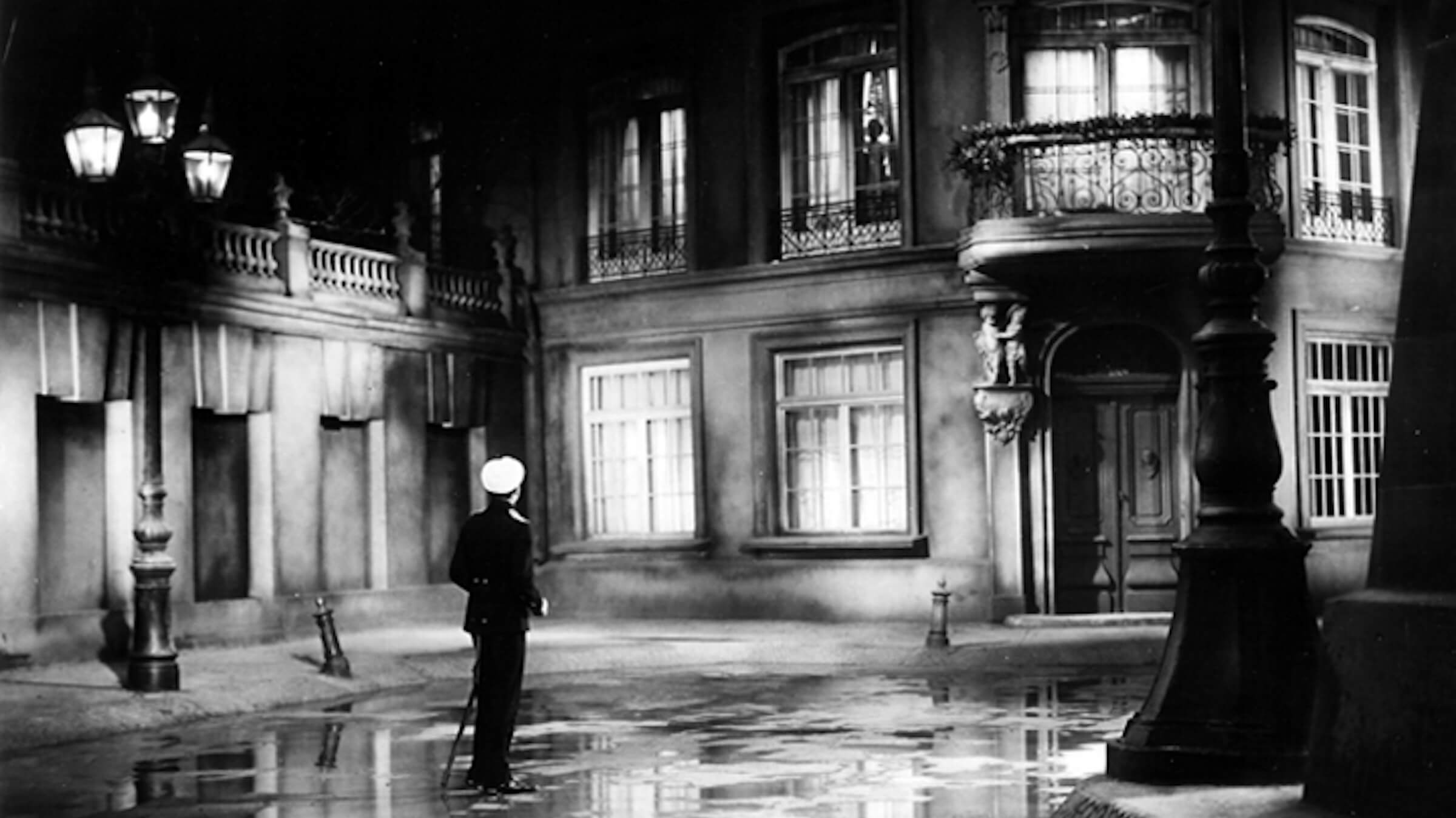A clock strikes 12. Whether noon or midnight is not yet known. Meanwhile in another room, a large bathtub filling with hot water nears to overflowing. As a servant girl closes the faucets in the nick of time, the camera begins to track backward, out of the steamy bathroom to the side of an unmade bed, its satin sheets embossed with the form of a recent sleeper, a half-eaten breakfast abandoned on a tray. The camera continues its languorous track, from the sumptuous boudoir out onto the terrace, where it settles at last on a tall, svelte figure in silk.
So begins The Wonderful Lie of Nina Petrovna, a tragedy of gossamer proportions that might have been written for Greta Garbo and one of the last silent films made at Germany’s Ufa studio. (In fact, two versions were made, one with sound effects and music synchronized; the visuals accommodate with lots of ticking clocks and piano cues.) Overseeing its making, a veteran producer sobered by his experience in Hollywood, about to lead his country’s transition to sound.
Far more than a moneyman, Erich Pommer always kept the artist in mind. His first big success, The Cabinet of Dr. Caligari, was the expressionist film that launched a cinematic aesthetic. Its creation was achieved during the lean, arduous days of the early Weimar Republic. When Pommer’s Decla studio reached its light and power quota before the end of the month, “… my three artists,” Pommer recalled years later, “brought in a proposition that seemed to me absurd, and even reactionary—‘why not paint light and shadows on the sets for the Caligari film.’”
He went on to foster the artistic visions (some might say enable) of a Who’s Who of Weimar cinema, including Fritz Lang, F.W. Murnau, and much of the talent behind Wonderful Lie: cinematographer Carl Hoffman, architects-turned-set-designers Robert Herlth and Walter Röhrig, and scenario writer Hans Székely. As production chief at Ufa (Universum-Film AG), he was the man behind the curtain on Fritz Lang’s Metropolis, which simultaneously solidified Germany’s reputation for producing dazzling spectacle and crippled the studio that produced it.
In the face of the financial disaster suffered because of Metropolis and the lure of the stable American dollar, Pommer turned toward Hollywood. He sold his Berlin home in 1926 and left for Paramount, where he produced two films by Swedish film industry export Mauritz Stiller. When story changes on a third film drove the director to quit, Pommer also resigned and was put in charge of foreign directors at MGM, where he clashed with chief of production Irving Thalberg, who assigned him, of all things, a western. Soon after, the German émigré accepted an offer to return home to Ufa.
But Pommer’s work style had forever changed, as he fully embraced Hollywood’s credo of entertainment over art. He defended his new formula back home in Germany’s film magazines. In August 1928 he was quoted as saying, “… the naïveté, the lack of complexity and of problems in the American film, which is attacked and seen as trivial—that precisely these characteristics are its main strengths in the battle on the international film market.” And, more directly, “It is better after all that a film is too light than that it is too heavy.” Critics only sometimes agreed. When Wonderful Lie premiered in Berlin in April 1929, one praised it as “a piece of intimate theater on film.” Another called it “deathly boring.”
The film may lack the art for art’s sake quality of Pommer’s pre-Hollywood productions like Dr. Caligari or the moral weight of a Metropolis or Last Laugh, but it still delivers in subtle doses on both. The moving camera on occasion soars like Nina’s heart, when she first sees her sweet, smiling lieutenant and then spots him again amid the sophisticated nightclub. Class struggle drives their tragedy, and the corrupt general (played in understated tones of sinister by great British actor Warwick Ward) gets a bittersweet comeuppance worthy of any serial villain but never elicits a single jeer.
For a time, Pommer’s business-first policy jibed with Ufa’s new management, which took over in 1927 and valued profit over other considerations. When sound came to town, Ufa exerted enormous pressure on Pommer to bring films in under budget to help compensate for the cost of converting to the new technology. In response, he pioneered a new genre, the film operetta. He produced Hollywood export Josef von Sternberg’s Der blaue Engel (1930), the groundbreaking The Congress Dances (1931) by Eric Charell, and Wilhelm Thiele’s charming Three from the Filling Station (1930), for which Pommer began the practice of shooting different language versions, with different stars, for international release.
But another kind of pressure from above superseded all others, and, with the rise of Nazism, the moneymen favored politics over profits. The Jewish talent had already begun its exodus out of Germany, Pommer himself entering into negotiations with Fox studios before production ended on his last German film, F.P.1. antwortet nicht (1932), directed by Karl Hartl. Joining Pommer in exile was a long list of cinema elite, including Wonderful Lie director Hanns Schwarz, who, along with Asphalt director Joe May, had made the last silents produced at Ufa and went on to prove himself a gifted partner in creating the German musical genre.
Two other exiles star in The Wonderful Lie of Nina Petrovna. Nina’s young lieutenant, the endearing Franz Lederer (who also plays the son in Pandora’s Box), became Francis in the U.S., starring in dozens of films and television productions and founding an acting school in Los Angeles, where he taught until his death at age 100. Brigitte Helm plays the lady of leisure we first see on the veranda.
At Ufa since age 19, Helm had her start in Metropolis and thereafter alternated between vamps and a few plum roles that stretched her. (She once sued Ufa because of typecasting.) She named Nina Petrovna as her favorite role and told one interviewer, “I really felt tenderness and love for my costar.” At least one critic concurred: “[N]ow, finally, without convulsions, she is like a lovely animated picture, dazzling in costumes made to accentuate her figure. When have we ever seen her smile this way, genuinely, charmingly, without the fake undercurrent of vampishness?”
Helm made 20-plus other films with some of Germany’s finest directors, most notably as the chiseled human sphinx in G.W. Pabst’s The Mistress of Atlantis (1932). She briefly worked in France and firmly resisted the temptation of Hollywood. She made a smooth transition to sound, often playing in all language versions of a film. Her final star turn, an adaptation of Oscar Wilde’s An Ideal Husband, was released in 1935, the same year that she married a Jewish industrialist and that Hitler began publicly flaunting Germany’s rearmament. It must have seemed like a good moment to retreat. She moved first to Italy then to Switzerland, where she raised a brood of four boys and, as far as we know, never looked back. Just like Wonderful Lie’s Nina Petrovna, she preferred to keep her regrets unspoken.
Presented at SFSFF 2012 with live music by Mont Alto Motion Picture Orchestra

